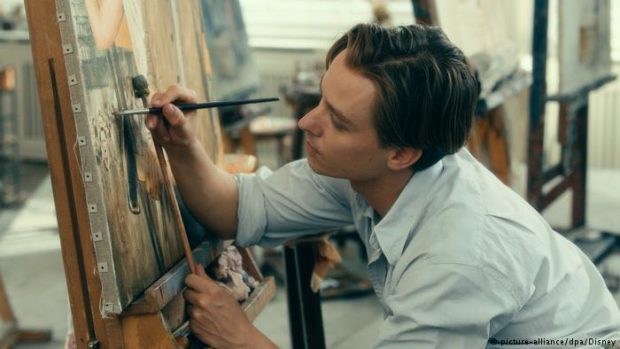 The story of the early life and career of an innovative German painter dramatizes the troubled history of that country from the Nazi period to its division during the Cold War.
The story of the early life and career of an innovative German painter dramatizes the troubled history of that country from the Nazi period to its division during the Cold War.
Never Look Away, the title of a new film by German writer-director Florian Henckel von Donnersmarck, is an admonishment to a young artist—everything true is beautiful, so the artist should not avert his eyes from anything real, for that is the source of his power. In its account of a young painter’s journey, the movie is loosely inspired by the life and early career of the famous German artist Gerhard Richter. And I do mean loosely, because there are some major plot elements that are wholly invented by Donnersmarck, who is most well known for his 2006 film about the surveillance state of East Germany, The Lives of Others.
Never Look Away begins with a visit by a small boy and his young beloved Aunt Elisabeth to a 1937 Nazi exhibition of so-called “degenerate art” in Dresden. The boy is Kurt Barnert, already dreaming of being a painter, and it is quite clear that the paintings excoriated by the Nazi tour guide are just the kinds of things he likes. Trauma lies ahead, as Aunt Elisabeth shows signs of mental imbalance that lead to her being snatched away by the state in its drive to eugenically cleanse the Aryan race. The mystery of Elisabeth’s fate will hang over the rest of the film, as Donnersmarck explores the baneful influence of fascist thinking on German society well after the end of the war, especially in the story of an SS doctor guilty of murdering the sick and disabled, played by Sebastian Koch.
As the film enters the postwar world, the adult Kurt, played by Tom Schilling, takes center stage. He enters art school in East Germany, where the only acceptable form of painting is socialist realism: heroic workers united in the struggle for a free society. Just as the Nazis had condemned modern art as decadent, so the Communists condemn it as selfish. Inwardly skeptical of official ideology, Kurt excels in art school—eventually being given prestigious portrait and mural assignments that set him on the way to a good and lucrative career. In the meantime, he meets a design student named Ellie, played by Paula Beer, and their passionate romance becomes the thread tying the entire story together. It’s not hard to tell that socialist realism won’t satisfy Kurt for very long, and that his artistic future lies in the West. Along the way, Donnersmarck keeps several different narrative strands going.
Now, it’s notoriously difficult to portray artistic practice on film—so much of it is contemplative, not action-based. Never Look Away succeeds in this partly through its depiction of two school environments—especially the second one, in Dusseldorf, which introduces us to a host of interesting and eccentric characters. The impulse to be dismissive of the avant-garde artists in Kurt’s school gives way to real insight as we get to know these people better. Meanwhile, the love story of Kurt and Ellie is complicated by the disturbing influence of her father, who seeks to prevent their marriage because he doesn’t like Kurt and wants his daughter to make a better match.
Donnersmarck has chosen an epic mode by which to tell this story. It covers a quarter century, from the Hitler era to the early 60s, within which there are a lot of traumatic and life-changing events. Audiences today tend to resist a longer film—but in order to do something on this scale, you need time. The film is a little over three hours long; for the most part this is time well spent in establishing the characters, the atmosphere, and the long-range impact of events. A shorter running time would not have done justice to the film’s vision. The superb cinematography is by Caleb Deschanel. The production design is first rate. Never Look Away attains a novelistic sweep and richness: this portrait of an artist doubles as a picture of a long-suffering and tormented country.

A parody of a host of film genres displays Wes Anderson’s style at its most avant-garde. I’ve talked a lot about Wes Anderson over...

One of the gems among Alfred Hitchcock’s early British films, Sabotage tells of an enemy agent in 1930s England, and the tragic consequences of...

A bold documentary, framed against the jazz of 1959-60, tells how the U.S. helped subvert the government of Congo after independence. Soundtrack to a...